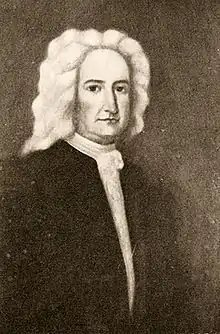Philip Ludwell
Philip Ludwell (1637/38—c.1716) of Rich Neck Plantation in James City County, Virginia was an American military and political figure, best known as governor of the British Colony of Carolina from 1691–94.[1] From a base in the coastal port city of Charleston, he was governor of the entire Colony of Carolina. (The northern and southern settlements were under a common government from 1691 until 1708.)
Philip Ludwell | |
|---|---|
 | |
| 9th Governor of South Carolina | |
| In office 11 April, 1692 – May 1693 | |
| Monarch | William III |
| Preceded by | Seth Sothel |
| Succeeded by | Thomas Smith |
| 24th Speaker of the Virginia House of Burgesses | |
| In office 1695–1696 | |
| Preceded by | Thomas Milner |
| Succeeded by | Robert Carter |
| Personal details | |
| Born | 1637/38 Bruton, Somerset, England |
| Died | c.1716 London |
| Spouse(s) | Lucy Higginson Lady Frances Berkeley |
| Children | Philip Ludwell Jr. Lucy Ludwell |
| Residence | James City County, Virginia |
Biography
Colonel Ludwell and his brother Thomas Ludwell were prominent citizens of Middle Plantation (which later became Williamsburg) in the Colony of Virginia. In 1676, he supported Virginia Governor William Berkeley during Bacon's Rebellion.[1] Later, Ludwell married secondly Berkeley's widow, Frances Culpeper Berkeley of Green Spring Plantation, her third marriage.[2] Despite her remarriage, she never relinquished her title as Lady Berkeley until she died in the 1690s and was buried at Jamestown.
After serving in the Colony of Carolina, Colonel Ludwell returned to Virginia, where he served as Speaker of the House of Burgesses in 1695–96. Around 1700 he moved to England, where he died.
References
- Parker, Mattie Erma E. (1991). "Ludwell, Philip". ncpedia.org. Retrieved 27 March 2017.
- "Berkeley, Frances Culpeper Stephens (1634–ca. 1695)". encyclopediavirginia.org. Virginia Foundation for the Humanities. Retrieved 27 March 2017.